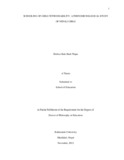Please use this identifier to cite or link to this item:
http://archive.nnl.gov.np:8080/handle/123456789/97| Title: | Schooling of girls with disability: a phenomenological study of Nepal girls |
| Authors: | Shah Thapa, Bishwa Bala |
| Keywords: | Disable - girls - education -- Nepal |
| Issue Date: | 25-Feb-2018 |
| Abstract: | This phenomenological study sets out to explore the ‘Schooling of girls with disability’ through the main research question ‘What does it mean to be a girl with disability? I chose this area of research because of my personal and professional interest. The schooling of girls with disability (GWD) is a growing phenomenon in many developing countries throughout the world because of increasing recognition of education as right, gender equality and mainstreaming of marginalised groups on all aspects of social lives. However, little attention has been given to conduct research in this area. Therefore, there is relatively very little literature focusing on the education of GWD in Nepalese context. The study was designed as a transcendental phenomenology under the broader qualitative research paradigm. This study relates to the subjective and multiple realities of the GWDs as per their schooling experiences. Knowledge can be drawn by collaborating with the participants and spending extended time in the field rigorously. Twelve GWDs, four from each disability group viz. visual impairment, hearing impairment, and physical impairment participated as key participants from five schools located in municipalities of a district in Kathmandu valley and a hill district outside Kathmandu valley. Research site and participants were sampled on the basis of convenience and purposive sampling methods. The primary sources of information were interviews, written responses (from hearing impaired ones) and observation. Phenomenological analysis and meaning making were done as suggested by Moustakas. The findings were linked with Giddens’ structure-agency theory and social justice theories of Rawls and Nozick. While analysing GWDs (agency) - school environment (structure) relationship, school was both opportunity and constraint for GWDs which resulted GWDs experiences both positive and negative. The results suggested that school culture; the available resources, facilities, and services at school were not accommodating GWDs fully and were unable to acquire knowledge and skills to their full potentials. Nevertheless, the GWDs were found diligent to maintain their educational status in comparison to other peers. Given the structural constraints, they were struggling to ensure their better future and were committed and enthusiastic to go ahead to lead a better life. Thus, as Giddens stressed on human agency’s transformative capacity, the GWDs were continuously involved in their active agency roles. The result from this study has showed light on the reality of school experienced by GWDs. There were findings showing good practices are appreciative but findings indicating negatives demand refinement. GWDs learned skills and tactfulness in adapting in the school environment from the experiences of people’s positive attitudes and encountered barriers. Positives of socialisation encouraged GWDs in participating school and social activities. Acceptance and positive attitudes of peers, teachers and community reduced hesitation and inferiority feelings of GWDs. The GWDs felt honoured by getting opportunity to formal schooling and also they were able to socialise with other peers in the school and participated actively as per their interest. Gaining education was ultimate means of safe adulthood for GWDs. However, negatives of socialisation experienced by GWDs like alienation and exclusion systematically in general. Thus, subject-teacher’s attitude compelled them to become passive listeners. GWDs faced similar world of limitation along with gender stereotypes like others in the society. Formal schooling empowered GWDs to stick with their aim of educational attainment and become self-supportive and ensure their better future. Schooling is therefore equated with change in the lives of girls with disability. However, there is a need of alternative/differentiation curriculum for GWDs/SEN children in providing fair opportunity to right-based education so that appropriate knowledge and skills can be acquired by them. The findings suggest the following implications; there is a need of redefining educational policies, which will strongly address educational needs of GWDs. There is a need for making the school environment participatory on the basis of equality. The perspectives of rights and social justice also need to be considered while working for disability-friendly school environment. |
| Description: | A thesis submitted to School of Education in Partial Fulfilment of the Requirement for the Degree of Doctor of Philosophy in Education, Kathmandu University, Dhulikhel, Nepal, 2012. |
| URI: | http://103.69.125.248:8080/xmlui/handle/123456789/97 |
| Appears in Collections: | 300 Social sciences |
Files in This Item:
| File | Description | Size | Format | |
|---|---|---|---|---|
| PhD Thesis - Bishwa Bala Shah Thapa.pdf | 1.55 MB | Adobe PDF |  View/Open |
Items in DSpace are protected by copyright, with all rights reserved, unless otherwise indicated.